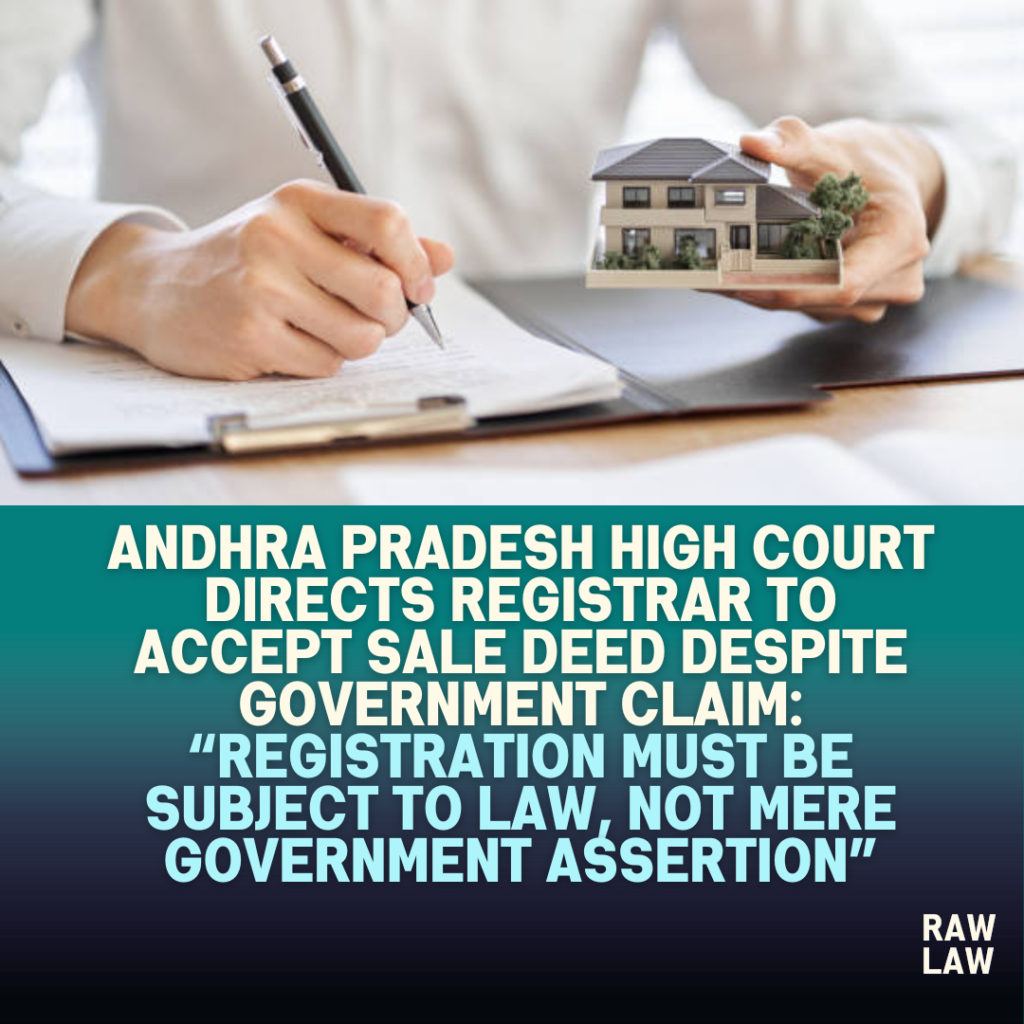Court’s Decision
The Andhra Pradesh High Court directed the Sub Registrar and District Registrar to receive and register a sale deed in favour of the petitioners concerning Plot No. 79 in Survey No. 74/7 at Dhanalakshmi Cooperative Housing Society, East Marredpally, Secunderabad. The Court clarified that registration must proceed if the document complies with the legal requirements, regardless of the Government’s claim that the land was Government property. However, it explicitly stated that the registration would be subject to the final outcome of the writ petition.
Facts
The petitioners approached the High Court under Article 226 seeking a writ of mandamus to compel the Sub Registrar, Marredpally, to accept for registration a sale deed executed in their favour. The sale deed pertained to a plot admeasuring 333.3 square yards situated at Dhanalakshmi Cooperative Housing Society, East Marredpally. The document was presented through a GPA holder, but the Sub Registrar refused to receive or register it, allegedly on the basis that the land was claimed to be Government land.
Issues
- Whether the Sub Registrar is justified in refusing to accept the sale deed for registration solely based on a claim by the Government that the land is Government property.
- Whether the petitioners are entitled to a writ of mandamus directing the Sub Registrar to register the sale deed.
Petitioner’s Arguments
The petitioners argued that the refusal to receive and register the sale deed was arbitrary, illegal, and contrary to the provisions of the Registration Act. They contended that the claim that the land is Government land cannot be a ground to prevent registration if the document otherwise complies with all statutory requirements. They relied on an earlier interim order passed by the High Court in W.P. No. 18829 of 2013, where a similar situation had arisen, and the Court had allowed registration.
Respondent’s Arguments
The Government Pleader for Revenue did not object to the petitioners’ plea and acknowledged that in similar circumstances, the High Court had granted interim relief directing registration, even when the land was claimed as Government land. The Government’s case did not rest on any specific statutory bar or notification but only on a general assertion regarding the nature of the land.
Analysis of the Law
The Registration Act, 1908, does not empower the Sub Registrar to refuse registration merely because of a dispute over title or ownership, particularly when the document is otherwise in conformity with statutory requirements. The act of registration is administrative in nature, not adjudicatory. Hence, refusal on grounds of title dispute, particularly when unresolved in any competent forum, is unjustified.
Precedent Analysis
The Court relied on its earlier interim order dated 02.07.2013 in W.P. No. 18829 of 2013, where under similar circumstances, it had directed the registration of documents subject to legal compliance, notwithstanding a Government claim of ownership. The same principle was applied in the present case to ensure consistency and avoid arbitrary denial of registration.
Court’s Reasoning
The Court reasoned that unless there is a statutory bar or judicial restraint, the Sub Registrar cannot refuse registration of a document that meets the legal requirements. The registration authority is not an adjudicatory body and cannot delve into title issues. The Government’s claim, by itself, cannot defeat the petitioners’ right to have a sale deed registered. The Court reiterated that any registration shall be subject to the final decision in the writ petition.
Conclusion
The Court directed the Sub Registrar and District Registrar to accept and register the document if it fulfills the legal formalities, regardless of the Government’s claim. The registration was ordered to be provisional, subject to the final outcome of the writ proceedings.
Implications
This judgment reinforces the principle that registration authorities cannot act as adjudicatory bodies in title disputes. It sets a precedent protecting bona fide purchasers from arbitrary administrative refusals and upholds the integrity of procedural law in land transactions. The ruling offers relief in situations where authorities refuse registration without formal adjudication or statutory backing.
Cases Referred
- W.P. No. 18829 of 2013: In this precedent, the Court had granted an interim direction permitting registration of a sale deed despite a pending Government claim over the land. This ruling was directly applied to the present matter to ensure parity and uphold legal consistency.
FAQs
Q1: Can a Sub Registrar refuse to register a sale deed based on a Government claim of ownership?
No. A Sub Registrar cannot deny registration solely on the basis of a Government claim if the document otherwise complies with legal requirements.
Q2: Is registration an adjudication of ownership or title?
No. Registration is an administrative function. It does not confer title nor does it adjudicate disputes over ownership.
Q3: What is the effect of such registration if the writ petition ultimately fails?
The registration is subject to the final result of the writ. If the petition fails, further consequences would depend on subsequent legal proceedings.
